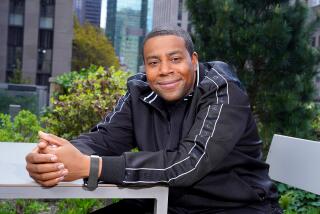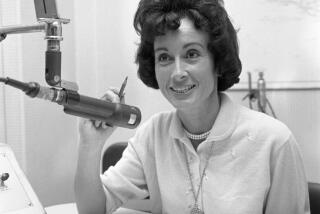LONG AND WINDING TAPE OF RADIO NEWS
- Share via
“Come on! Come on!” KNX reporter Diane Thompson yells at her cassette recorder as she replays a taped interview in the production cubicle at the news station’s Hollywood building.
Sorting through hours of tape proves frustrating. Finally, it hit her: “Drugs are a big problem and drug testing is the only solution. Boom! That is how I will open the documentary,” she says.
Thompson is the KNX reporter who got the call to write, produce and narrate this month’s radio documentary, “The Question of Drug Testing,” which airs at 6:30 p.m. Thursday on KNX-AM (1070).
At KNX, one reporter each month puts in the long hours of work for the documentary series “Assignment ‘86,” a combination of music and interviews aimed at home-bound commuters.
Last year, a combination of “Assignment ‘84-’85” brought the station a prestigious Columbia-Alfred I. duPont Award, broadcasting’s equivalent of the Pulitzer Prize (See accompanying story).
The road to the moment of truth that brings the radio documentary together is long and winding, and for Thompson it all starts with the manila envelope she uses as a receptacle for all the wire-service copy and magazine and newspaper clippings that come her way.
Whatever Thompson can find on the drug-testing controversy she rat-packs away, skimming the text for names and places. Then she looks to the KNX Rolodex, a listing of experts in various fields.
But letting her fingers do the walking isn’t enough.
“Doing the interviews and getting the people lined up, that’s the hard part,” she says.
Given the daily demands of her job as a full-time radio reporter, Thompson uses her weekends to prepare the documentaries.
“You know, I’ve told my boyfriend, ‘You are not going to see me this month because I’m doing this documentary’.”
One Friday, her interview schedule looked like this:
--10 a.m. Coldwater Canyon Hospital, North Hollywood: Dr. M. David Lewis, medical director of Adult/Substance Abuse Program.
--11:15 a.m. Union Bank building downtown: state Sen. John Seymour (R-Anaheim).
--1 p.m. KNX newsroom, CBS Studios, Hollywood: Check in at home base.
--2:30 p.m. UCLA: member of Presidential Commission on Drug Abuse.
With all the footwork completed, Thompson spent dozens of hours in a production studio winnowing down seven hours of tape accumulated from 17 interviews to fit 19 minutes of air time for the half-hour documentary; the remaining time going to commercials, introductions and credits.
“If I use only one minute of each person, that would take up 17 minutes,” she says.
“This is my system,” Thompson says, going through reams of notes. “I take all the interviews I have done and I cut them all up into 20-second (sound) bites. I get all my notes and all my thoughts together and I make an outline.”
The strategy is to define the problem the documentary addresses, then determine how to bring it into focus.
It’s no secret that sound is the key in a radio documentary, Thompson says, but “that first minute of sound is the real hook.”
Thompson uses “bump cuts” (splicing different interviews, known as “actualities,” back to back) for a rapid-fire succession of voices.
Thompson also uses music to pace the show and set the mood. With interviews and narration on one track of a reel-to-reel tape, she records snippets from movie sound tracks and songs that deal with drugs, among them such hits as Huey Lewis and the News’ “I Want a New Drug” and Eric Clapton’s “Cocaine.”
The toll may not show on her face, but the 28-year-old Texas native has put in long hours.
“Whenever you have somebody working on the documentary, you always know that you leave them alone. They are locked away in the studio for eight hours at a time, and everybody knows that the person coming out of there with wild eyes and hair everywhere is working on a program.”
Thompson worked until 1 a.m. Monday, finishing the script and finalizing the title. But the end product will be ready only 24 hours before it airs.
“It is very intense. I mean it all sounds like it’s so easy to do, but it is very intense.”
More to Read
The complete guide to home viewing
Get Screen Gab for everything about the TV shows and streaming movies everyone’s talking about.
You may occasionally receive promotional content from the Los Angeles Times.






